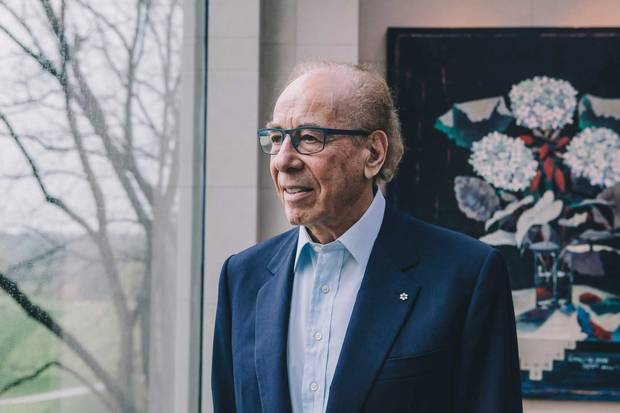
Issy Sharp, shot at his home overlooking a golf course in North Toronto, in spring 2017
Aaron Wynia
I'm not sure I ever stayed in a hotel when I was growing up. We didn't have the money to spend money on what my mother would call foolish things.
The fact that my sisters and I could read and write—my parents thought we were great! There were no great expectations.
My father was a plasterer by trade. I trained in architecture, and then my life was as a builder. I wasn't forced to go work with my father—I loved it.
A friend of the family was going to build a small hotel, and he asked me to build it. I was surprised by its success. If they could do it there, in the middle of nowhere outside Toronto—gee, wouldn't the concept work better in downtown Toronto?
It took me five years to raise the money and for other people to believe in the idea.
My first hotel was called the Four Seasons Motor Hotel—a little oasis in the middle of the red-light district of Toronto. But my approach was, people coming from Chicago or New York didn't really know much about Toronto, so the fact that this street had a bad reputation didn't matter. Fortunately, it worked. And if it didn't, I would still be paying off all the money I'd borrowed.
I knew if we could come up with a very simple message, it would give our people a definite understanding of what we were trying to do. That's when I came up with the Golden Rule—the one simple, profound statement that was the beginning of our service culture.
Your people must understand what the objectives of the company are. Our business strategy was to open medium-sized hotels of exceptional quality and try to be the best. So the ideas you come up with are quite specific to what would satisfy that group of people—you're not doing a shotgun approach.
It's not rocket-scientist stuff. Look at it from the customer's perspective: What would be helpful to you when travelling away from home? We were the first company to put shampoo in the bathrooms. I thought of that. I grew up with three sisters, and I kew girls never washed their hair with soap. So it just made good sense. There's a long list of Four Seasons innovations that have become part of the industry norm—bathrobes, minibars, 24-hour room service.
People in the industy said, "This will never work—you're going to broke, you're not going to get people to pay for these things." But they did.
We didn't invent anything, but we innovated.
You have to be able to compete on something you do better than others, or you can dominate through scale. So either you're very big or you're very good.
The CEO job is a lonely position. The buck stops there. But I was the only one who could fire me, so I was able to decide when it was time to step off the stage and what I would like to keep doing.
I've always maintained that leadership is situational—not every leader fits every situation.
I met Donald Trump many years ago, when he'd bought the Plaza Hotel and asked me to come talk to him. He endorsed the back of my book: "Four Seasons truly sets the gold standard for excellence. Isadore Sharp is a great guy." I can proudly say the President of the United States endorsed my book.
I most admire men who are great visionaries and have the ability to get people to buy into that vision—like Bill Gates, Steve Jobs and Larry Ellison.
I have an expression: If you're always right, you're wrong. Because you've never taken that step off that might be a little different.
Fortunately, I haven't made a destructive mistake. But many years ago, I was building a hotel in Vancouver, and costs were sky-high. The deal I'd initially entered into with my partners was never going to work. On a handshake, they said, 'Finish the hotel and then we'll see what we can do to restructure.' I realized I could not continue to build and own these hotels, but I knew I could manage them better than anybody, so that's when manager-operator concept was born.
My friend Prince Waleed's company, Kingdom Holdings, and Bill Gates's company, Cascade, are great partners. They understand the future of Four Seasons, and this is a long-term commitment they've made.
We now have over 100 hotels, and every year, our development department will add at least another 10. The company will become better as we become bigger.
Our lives are circumscribed by chance events. Had I not attended my cousin's wedding—my mother forced me to—I never would have met my wife, Rosalie.
Our days are limited, so you have to make sure you have a partner you can trust and whose opinion you respect. I'm fortunate to be married to one of most remarkable persons I've ever met. She is extraordinarily bright and accomplished, and doesn't realize it. It's shocking some days.
Technology is dramatically changing and developing new industries, and at same time decimating others. But there isn't anything that can replace the hotel industry.
The travel and tourism industry is the largest industry in the world and growing at 4% a year, because the demographics have changed over the last 20 years. When we started, North America and Europe were the primary areas for developing hotels. That's maybe a billion people. Today you've got China, India, Russia, Latin America—a population of maybe four billion people. That's the future.
You can't do business sitting in your office. You must communicate. And the only way to effectively communicate is not by talking on the telephone. You must travel. So the hotel industry has a great future.